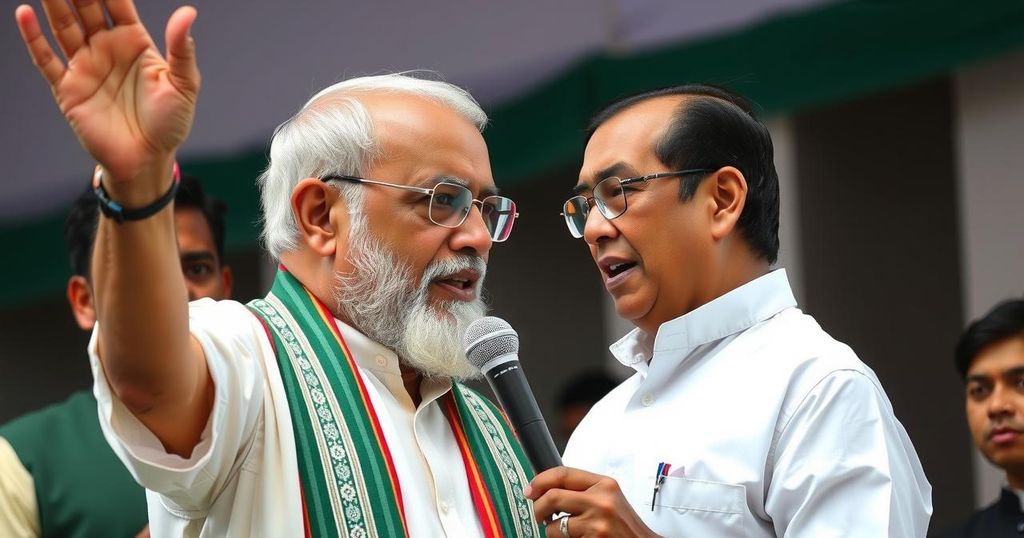Bangladesh’s Political Crisis: Tensions Rise Between BNP and Yunus Government
Bangladesh is facing impending political turmoil as tensions between Prime Minister Muhammad Yunus’s government and the Bangladesh Nationalist Party (BNP) escalate. The BNP claims that Yunus is attempting to delay elections to consolidate power, prompting demands for an immediate electoral process. With rising opposition and public discontent, violence may emerge, raising significant concerns for regional stability and India’s strategic interests.
Bangladesh is poised for significant political upheaval as tensions mount between Prime Minister Muhammad Yunus’s government and the Bangladesh Nationalist Party (BNP). The BNP perceives Yunus and his administration as conspiring to delay upcoming national elections, which they believe they would win due to their unrivaled political position. Consequently, the BNP, motivated by the urgency to hold elections, is challenging Yunus, who has demonstrated an unwillingness to facilitate a timely electoral process. Amidst pressures from both political factions, the conflict may lead to increased instability, raising concerns for regional dynamics, particularly regarding India’s interests in the situation.
The BNP leadership strongly suspects that Yunus is orchestrating a strategy to postpone elections, relying on vague conditions and calls for political consensus as justification. This approach, according to BNP officials, is designed to prolong his administration’s hold on power while enabling the formation of a new political party, backed by the Anti-Discrimination Students’ Movement (ADSM). The BNP demands immediate elections, expressing concerns that any delay will compromise their current advantages. Yunus’s reluctance to set a firm timeline for elections fuels the perception that he seeks to maintain authority amid rising opposition.
Moreover, the ADSM, associated with Yunus, plans to establish a new political entity, which the BNP believes is part of a broader strategy to consolidate power. The BNP leadership asserts that Yunus’s role in supporting this endeavor is an inappropriate use of his position in the interim government, which is expected to remain impartial while administering necessary electoral reforms.
As the BNP expresses frustration over the lack of political will exhibited by Yunus, the political rivalry intensifies. Public confrontations between the BNP, aggressive in its criticisms, and Yunus’s administration have yet to materialize fully. However, analysts predict an escalation of verbal hostilities and possibly violent confrontations with the Jamaat-e-Islami party, which partners with Yunus’s administration, underscoring the precariousness of the current political climate.
For India, developments in Bangladesh are of significant concern. Following the fall of Sheikh Hasina’s government and the rise of the Yunus administration, India has re-engaged with the BNP as a potential ally, ensuring its interests are protected against the backdrop of increasing Islamist influence. As chaos looms, India may find it beneficial to support the BNP in wresting power away from Yunus to avert the rise of anti-Indian forces in the region. Thus, the unfolding political dynamics in Bangladesh are critical for India, which seeks to safeguard its strategic interests in South Asia and promote stability in its neighboring nation.
The political landscape in Bangladesh is currently characterized by a significant confrontation between the ruling party led by Muhammad Yunus and the opposition Bangladesh Nationalist Party (BNP). In recent months, the BNP has accused Yunus of conspiring with the ADSM to postpone national elections, despite the BNP’s advantageous position following the decline of the Awami League. The implications of this political struggle extend beyond domestic issues, affecting regional stability and India’s strategic interests, necessitating attentive observation from external actors.
In conclusion, the political turbulence in Bangladesh represents a critical juncture that could reshape the nation’s future. As the BNP prepares to confront Yunus’s government, the likelihood of protests and increased violence looms, emphasizing the stakes involved in the electoral process. For India, supporting the BNP may serve to uphold its regional interests while ensuring that instability does not facilitate a rise in Islamist influence. The coming months will likely determine the trajectory of political dynamics in Bangladesh and their broader implications for South Asia.
Original Source: swarajyamag.com








Post Comment